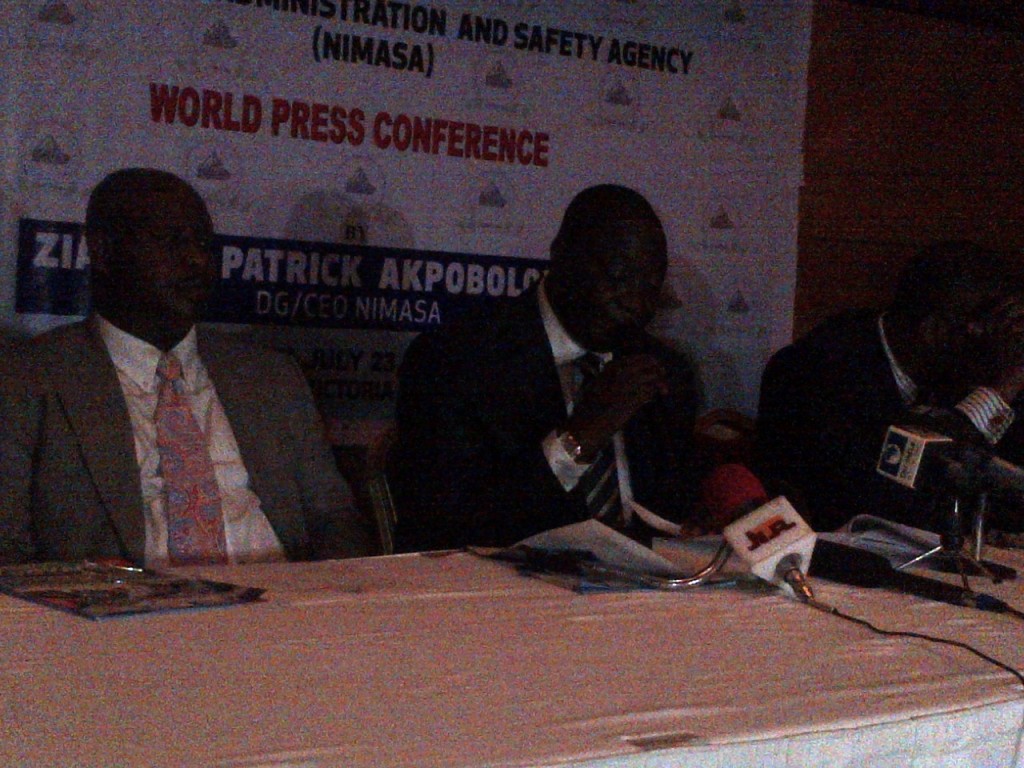… trains over 2,500 seafarers in 5 years
The Nigerian Indigenous Shipowners Association (NISA)’s dream of floating a National Carrier Line on Wednesday received a boost as the Nigerian Maritime Administration and Safety Agency (NIMASA) said that there could be more than one National Carrier in the Nigeria’s Shipping industry.
The Director General of NIMASA, Mr. Ziakede Patrick Akpobolokemi who made this known while addressing a World Press Conference in Lagos also assured that no one who met the requirements for floating a National Carrier would not be discriminated against.
Represented by the Executive Director Shipping Services in NIMASA, Capt. Ezekiel Bala Agaba, Akpobolokemi stated that the new National Carrier Line which would be largely driven by the Private sector that would solely be responsible or the operation and Management of the country would re-establish the presence of Nigerian Flag in international waters and provide training and retraining of the Nigerian seafarers while also serving as a catalyst for shipping development in the country with a resultant positive impact on the nation’s economy.
According to him,” section 35 (a-g) of the NIMASA Act 2007 stipulates the requirements for the granting of a National Carrier status by the Honourable Minister of Transport on the recommendation of NIMASA”.
“All applications made to NIMASA would be considered against the requirements stated in the NIMASA Act 2007 and companies that meet these requirements will certainly be recommended t the Hon. Minister of Transport for the granting of the National Carrier licenses”.
“Distinguished Ladies and gentlemen, for the records, please take note that there can be more than one National Carrier in Nigeria’ Shipping industry and no one that meets the requirements would be discriminated against”.
He further observed that the proposed National Carrier line could benefit from the Nigerian Content Development Policy, the Cabotage Law, the Public Sector Cargo Support Scheme which provided for exclusive carriage right of all public sector cargoes (federal, state and local government levels) for indigenous carrier as well as the NNPC enabling instruments which provided for at least 50 percent of all hydrocarbon affreightment by the corporation.
Speaking on the Nigerian Seafarers Development Programme (NSDP), the Director General disclosed that under the programme which started five years ago, over 2,500 young Nigerians had benefited or were currently enjoying various levels of sponsorship in schools in the United Kingdom, Egypt, Romania, India and Philippines.
He went on to say that the first set of twenty-three (23) qualified seafarers under the scheme had already emerged from the Arab Academy for Science, Technology and Maritime Transport, Egypt having completed their sea time training and earned their Certificates of Competencies (CoC).
“Distinguished ladies and gentlemen, 14 of them graduated with first class Honours while one of our students emerged the best overall graduating student from the institution this year”.
“We are not relenting in our quest to ensure that all beneficiaries of this programme acquire sea time training which was a challenge in the past. At the moment, 51 of our students are at sea acquiring their sea time experience on various ocean-going vessels. Another set of 33 are also ready to join their colleagues at sea before the end of August, 2014”, he said.
The Director General further revealed that with Plateau state recently enlisting into the programme, the agency now have a total of 17 states working with it to sponsor young Nigerians for the NSDP while urging other states who are yet to key into the programme to embrace the programme.
He said,” the agency has also introduced a programme for ratings. Two hundred (200) beneficiaries will be going to the Philippines while 100 are billed to proceed to Malaysia for training. We have no doubt that in the next five years, Nigeria would have produced a sizeable number of seafarers”.
On Maritime Labour, Akpobolokemi noted that the present leadership of the agency had given priority attention to both infrastructural and human capital development adding that that was in recognition of the fact that that formed the basic requirement to grow any sector.
He also added that the fact that a well trained workforce would provide the ingredient for a highly productive sector.
“At NIMASA, training and retraining of dockworkers is an ongoing exercise. In the first half of this year, 1, 497 dockworkers have benefited directly from various training programmes. Eight hundred and ten (810) seafarers have also enjoyed Standard of Training, Certification and Watch Keeping (STCW ’95) training within the past six months. This is to bring them up to date with the amended basic mandatory training, tanker familiarization and engine/deck watch keeping amongst other progrmmes”, Akpobolokemi said.
While acknowledging that sea time training had been a major challenge for the nation’s seafarers in the past, he however said that the agency’s policy of quietly placing seafarers onboard Cabotage vessels had recorded tremendous success saying that at the moment, 3, 938 seafarers and 44 cadets were at sea onboard Cabotage vessels through the policy.
On the Maritime Labour Convention (MLC 2006), Mr. Akpobolokemi hinted that the adoption and subsequent ratification of the Convention of the International Labour Organization (ILO) by Nigeria has brought to the country national and international recognition.
“Before the entry into force of the Convention, the agency trained MLC 2006 inspectors with the assistance of the International Labour Organization (ILO) and held special sessions with Ship owners, Shipping agents and Seafarers’ employers to intimate the stakeholders on their obligations to the Convention. The MLC 2006 is now fully operational in Nigeria and enforcement has started in earnest with applicable sanctions for defaulters”, Akpobolokemi stated.

